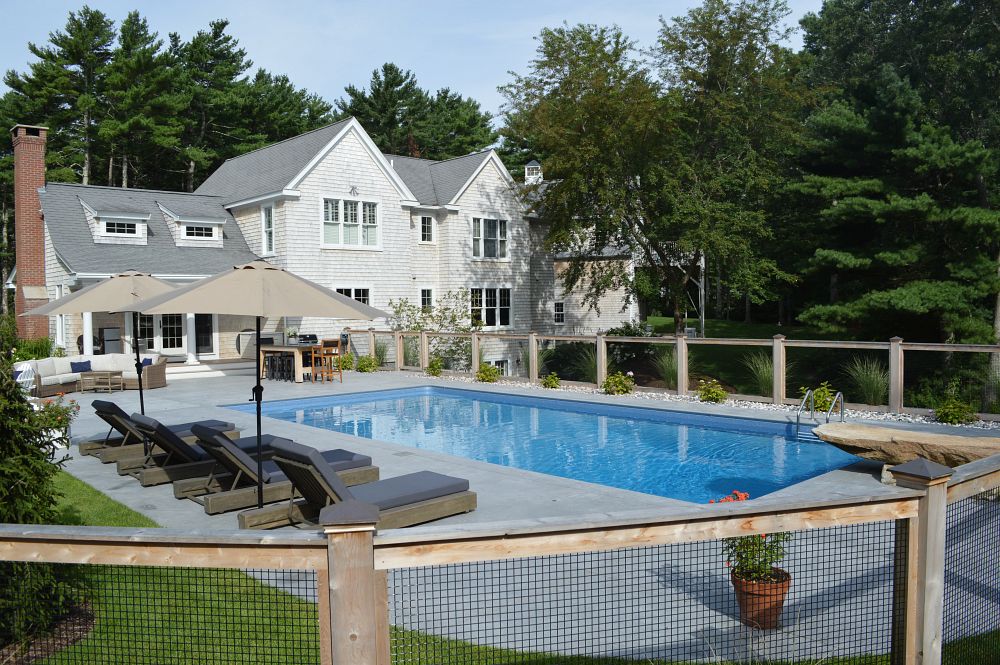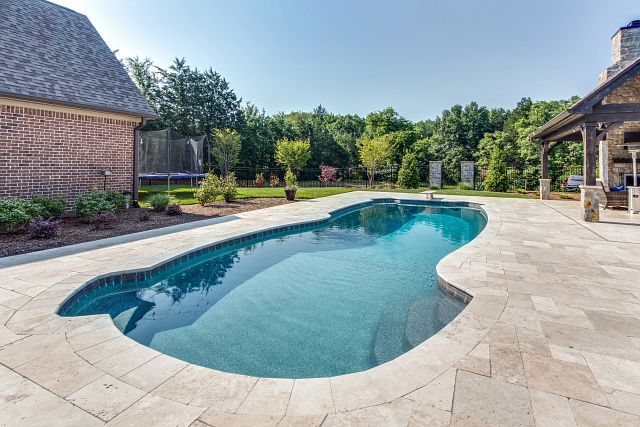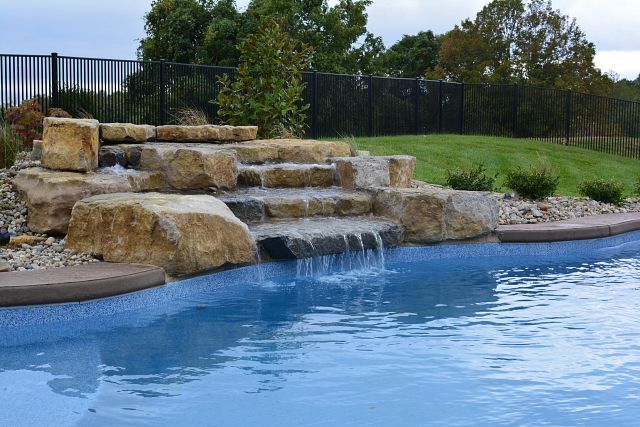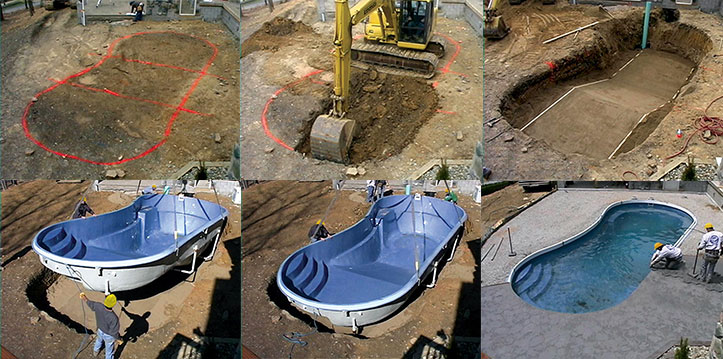New Jersey may be known as “The Garden State,” but nothing compliments lush greenery like a gorgeous pool. Whether you live in Bergen County just outside of New York, Trenton, Hackensack, or even any of the state’s numerous shore towns, a vinyl or fiberglass pool can offer you a private getaway of your own and a great way to beat the heat during humid Jersey summers.
A swimming pool can help you make countless memories right in your own backyard. It’s a hub of activity to gather with family and friends for informal backyard get-togethers or celebrating milestone events. A pool also offers you a quiet refuge from the hustle and bustle, giving you a spot to float with a cold drink in hand, or the option to take a refreshing plunge.
New Jersey’s position on the East Coast near the Atlantic Ocean gives it humid summers, making a pool a welcome addition to your backyard. Although the state receives colder winter weather, adding a spillover spa can give you more use of a watery sanctuary year ‘round, offering added relaxation when temperatures take a dip.
Fiberglass and vinyl liner pools are among two of the most popular inground pool types in New Jersey. In addition to sharing more about these types of pools and popular designs, we’ll walk you through the basics of pool ownership in New Jersey, including residential swimming pool regulations, seasonality, maintenance and more.
New Jersey Fiberglass Pools
Fiberglass pools are popular with many New Jersey homeowners due to their longevity, ease of maintenance and numerous benefits. Not only do they look great, but their smooth surface makes them a joy to wade in – with no rough patches grating against your skin. Because fiberglass shells are pre-fabricated, they’re one of the fastest types of pools to install – allowing you to start making poolside memories sooner!
“Based upon the limited time available for the pool season, our one-day installation allows the customer to go from zero to swimming in a fraction of the time associated with a liner or gunite pool,” observes Derek C. Blasker of Fiberglass Pool Designs in Yardville, NJ
Fiberglass Pool Designs for Your New Jersey Home
Fiberglass pools come in a wide variety of shapes and sizes. Whether you want to choose from pools that are popular with New Jersey pool owners, or buck the trend with something that speaks to your personal aesthetic, there’s a pool for every personality. Here are just a few shapes and models to consider:
- Rectangular – Rectangular shaped fiberglass pools offer timeless style and clean lines. They come in a variety of lengths and depths, capable of working with just about any style of backyard. Here are some of our favorite models:
- Claremont– The Claremont’s striking good looks and Crystite color technology aren’t the only things to love about this pool. It offers swim-up seating, slip-resistant steps, and is autocover-ready, making it fun (and safer) for everyone!
- Barcelona – With elegant curved stairs and stylish simplicity, the Barcelona is equally at home for exercise or entertainment.
- Corinthian 14 – The Corinthian 14 incorporates clever features, such as a wide top step that can pull double-duty as a tanning ledge, as well as plenty of swim-up seating to accommodate guests.
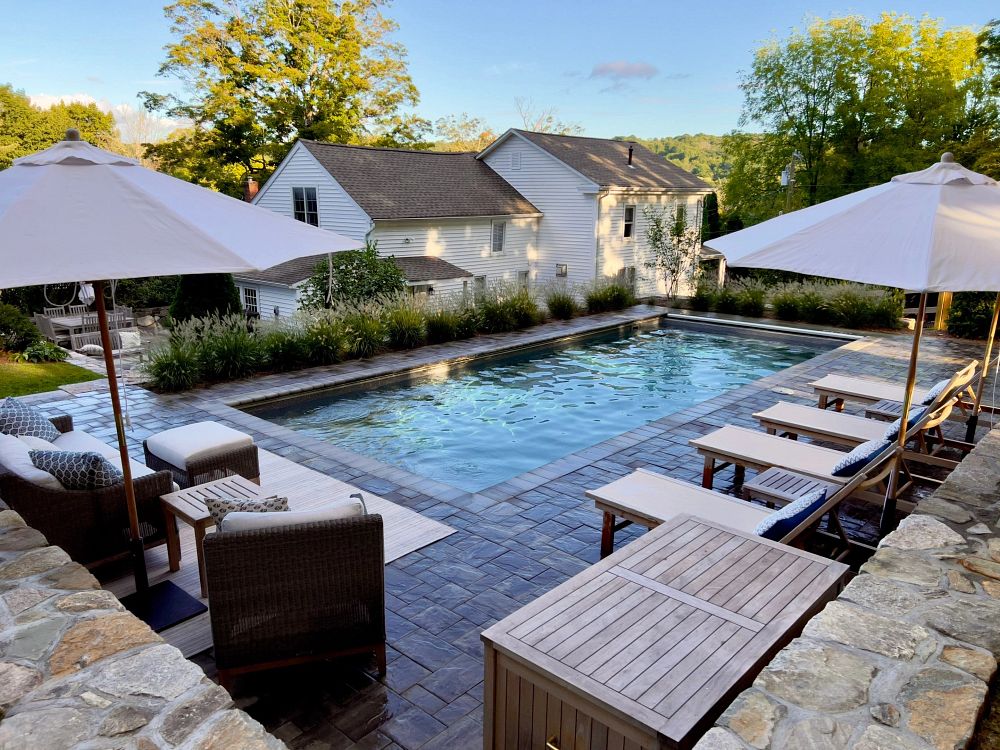
- Freeform – Freeform pools can give your backyard a bespoke look. Available in a range of sizes and shapes, they can work for large or small backyards and lend themselves beautifully to a variety of features and add-ons. Here are just a few of our freeform favorites:
- Cancun – This modern freeform pool model offers curved slip-resistant steps and swim-up seating, making it an ideal pool for both splashing around and entertaining.
- Key West– The Key West stands as a shining example of a classic style of freeform pool. Its design incorporates slip-resistant corner steps, which maximize the amount of space you have to swim, with plenty of room to spare for add-on features to further personalize your pool.
- Odyssey – The striking Odyssey model offers a distinctive humpback design that allows for a tanning ledge or bench – not to mention plenty of space to swim.
- Aruba – The Aruba is a great small pool option, offering a beautiful contoured shape with dimensional swells and dips for fun for the whole family.
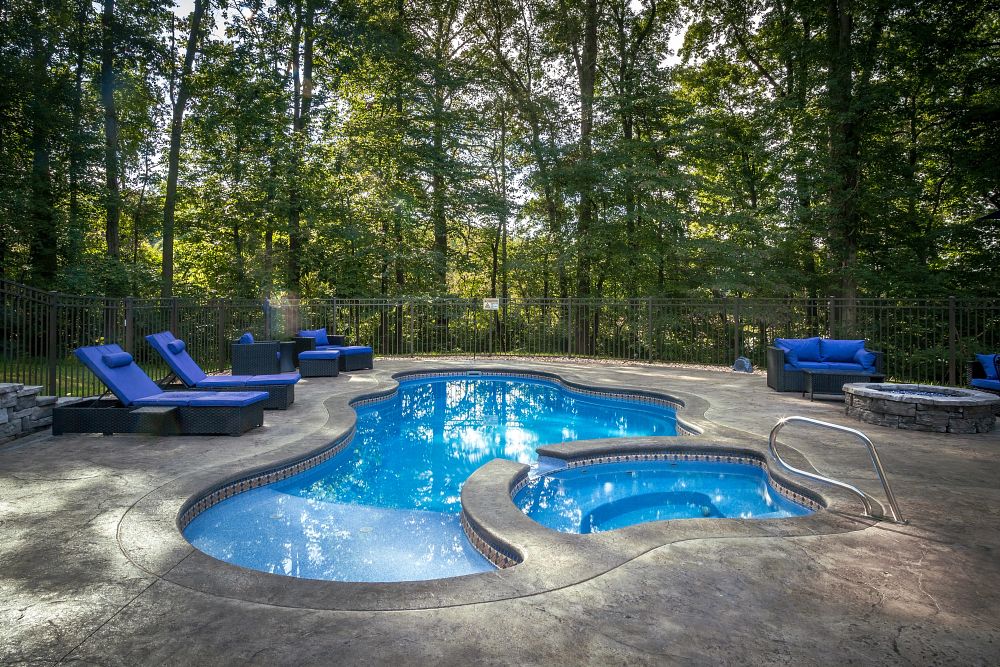
- Plunge – If you have a smaller backyard, plunge pools can be an ideal solution that offers the full experience of a larger pool in a more compact size. Plunge pools are great for exercise and swimming laps thanks to their rectangular shape and greater depth than other compact pool types, like cocktail pools or dipping pools.
- Milan: Simple-yet-striking, the Milan offers exclusive color options with Crystite color technology alongside slip-resistant steps and ample swim-up seating. Its compact 10’ x 16’ size and 4’ makes this plunge pool ideal for yards with limited space, helping you maximize the fun factor.
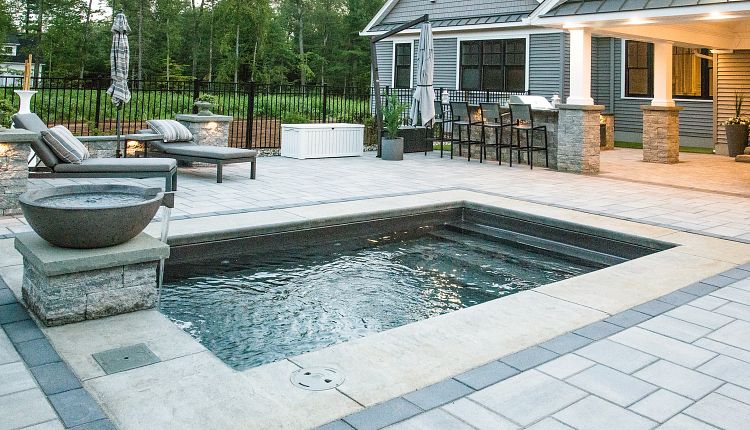
- Kidney – Kidney-shaped pools straddle the line of a classic shape with free-form elements. They are ideal for small or irregularly-shaped yards, allowing you to make the most of your space. Here are just a few kidney-shaped pool options to explore:
- Jamaica – Transport yourself to the tropics from the comfort of your backyard! The Jamaica’s compact size, swim-up seating and beverage benches give this pool an air of luxury, while slip-resistant steps make it accessible for every member of the family!
- St. Lucia – With its tiered wedding cake steps and ability to be customized with a range of features, the St. Lucia is easy on the eyes and spacious enough to make it a hub of activity in your backyard.
- Valencia – The Valencia is a versatile model that’s ideal for entertaining guests (hello, swim-up seating!), relaxing or exercising.
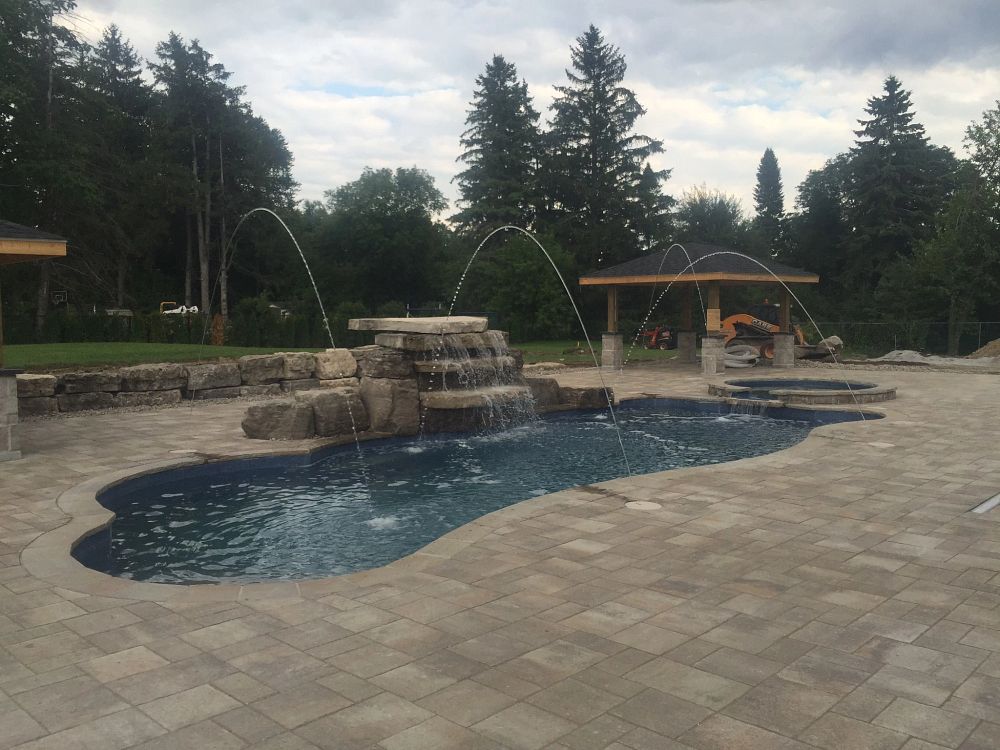
Transforming or Replacing Your Current Pool
If you have an older pool and are planning on replacing it, a new fiberglass pool can upgrade the aesthetic value of your swimming pool and give you decades of enjoyment – as well as reduce the amount of upkeep required to enjoy your pool to its fullest!
Many older New Jersey pools were made from concrete or gunite. Gunite pools can become rough and chalky with age. They’re also porous – making them more prone to algae. Not only can pool algae compromise the beauty of your pool due to hard-to-remove stains, but it can also make it more difficult to balance the water chemistry of your pool.
By contrast, fiberglass pools are far easier and less expensive to maintain over time. If well-maintained, your fiberglass shell pool can look as gloriously crystalline as the day it was installed – and give you a smooth, comfortable place to wade. Better yet, fiberglass pools don’t require as rigorous a maintenance schedule as concrete pools, giving you more time to spend in your pool instead of tending to it!
New Jersey Pool Regulations
Owning a pool is a lot of fun – but it also comes with its fair share of responsibility. If you’re planning on owning a pool in New Jersey, it’s important to be sure it complies with all state and local rules, regulations and guidelines.
Although we’ve collected some of the most commonly asked questions around pool regulations in New Jersey, pool safety and maintenance regulations can change over time. Be sure to do your homework before taking the plunge into pool ownership so you can be certain you’re compliant with the most recent guidelines.
- What is the maximum pool depth for a residential pool in New Jersey?
Currently, there are no laws around how deep a pool can be in New Jersey, although most pools are designed with a maximum of eight inches as their deepest point.
While New Jersey does not have rules around pool depth maximums, the state does, however, have regulations around the minimum depth of water that constitutes as a swimming pool – and that these structures must adhere to state and local regulations in order to be compliant.For instance, the New Jersey Uniform Construction Code defines a swimming pool as “any structure intended for swimming, recreational bathing or wading that contains water over 24 inches (610mm) deep. This includes in-ground, aboveground and on-ground pools; hot tubs; spas and fixed-in place wading pools… The 24-inch measurement should be taken from the deepest point of the interior floor surface to the uppermost part of the pool/spa wall.” In order to be compliant, if your pool contains 2 feet of water, it must adhere to state and local regulations, including those pertaining to proper fencing, covers and distance from a home. - How far does a residential pool have to be from a building, like your house?
New Jersey has specific requirements for how far a pool should be placed from a residential dwelling. For instance, according to the Cherry Hill Township Pool Permit Guidance documentation, a residential pool “must be a minimum of twelve (12′) feet from the foundation of any principal structure, measured from the edge of the pool’s surface.” Similarly, this guidance also states that “No private residential swimming pool shall be constructed, installed, or located on any lot unless a residential dwelling is also located thereon.”
By contrast, East Brunswick, NJ requires that “no pool shall be constructed or installed within ten feet of any property line.”
As you can see, rules vary from city to city within New Jersey. That said, when you’re planning a pool, be sure to do your homework and confirm all codes, permits, and requirements with your local building offices before breaking ground. Working with a professional pool builder can help you more easily navigate this process and be sure your beautiful new pool is compliant with state and local regulations.
- Do you need a fence around an inground pool in NJ?
Yes, you do need a fence around an inground pool in NJ. The New Jersey construction code defers to the International Swimming Pool and Spa Code (ISPSC), which requires that pools have a fence, wall, or barrier “not less than 48 inches (1,219mm) above grade where measured on the side of the barrier that faces away from the pool or spa. Such height shall exist around the entire perimeter of the barrier and for a distance of 3 feet (914 mm) measured horizontally from the outside of the required barrier.”
While these regulations are the state requirements, your local building codes may have different, potentially more stringent requirements. It’s always a good idea to investigate for yourself and work with a professional builder to be sure your pool – and fencing – is up-to-code for your area. - Are pool covers required, and if so, what kind?
New Jersey requires that all new and existing swimming pools have a barrier that prevents unwanted use of a residential pool. Specific requirements may vary depending on the municipality where you live, as some may recognize a proper barrier in lieu of a pool cover or automatic pool cover, while some may require homeowners to have a fitted pool cover that meets more stringent requirements and building codes. It’s always a good idea to check with your local building department to confirm any additional regulations in order for your pool to be compliant.Beyond legal requirements, it’s also a good idea to invest in a safety cover for your pool. Not only can it help reduce any debris that falls into your pool when not in use, but it can also prevent small children and pets from accidentally falling in.
New Jersey Seasonality
New Jersey has hot and humid summers, comfortable spring and fall, and cold winters with snowfall. And while June, July and August are prime time for swim season, New Jersey pool owners can still get a lot of mileage from their pools throughout spring and fall.
For instance, a heated pool can offer you more optimum temperatures to splash and frolic even when temperatures dip slightly and before it’s time to close your pool before winter sets in. Similarly, the addition of a spillover spa can also give you even more pool time and relaxation in cooler seasons.
However, seasonality doesn’t just impact the way you use or maintain your pool, it can also play a role in when you may want to start building your pool. Typically fall or winter is the best time to start building your pool in New Jersey. This will allow you to properly plan, recruit a pool builder, and have your pool ready as soon as warmer weather hits.
If you already have an existing pool, New Jersey residents typically look to open their pool in March, giving them plenty of time to perfectly balance their water chemistry and dive right into enjoying it once warmer weather arrives.
Maintenance
One of the most beautiful things about fiberglass pools – besides their appearance – is that they’re relatively low-maintenance. That said, you’ll still want to keep a regular regimen of upkeep to be sure your pool stays in tip-top condition. Here are a few maintenance tasks you should mark on your calendar for your fiberglass pool.
Regular pool maintenance tasks (once per week):
- Check your water levels and refill your pool as-needed if water evaporates
- Check your water chemistry levels and pH
- Skim your pool every few days
- Scrub your pool and/or vacuum your pool
- Empty your filter basket
- Be sure your filter is running for at least six hours per day
Monthly / periodic pool maintenance tasks:
- Test your pool’s chemistry, paying close attention to pH, alkalinity, calcium hardness and more
- Clean your filter regularly and back-flush your filtration pipe
- Check your pool for cracks and stains
- Tend to any stains to keep your pool sparkling
Inground Vinyl Liner Pools in New Jersey
Vinyl liner pools are another popular option with many New Jersey homeowners. These pools are known for their versatility, affordability and longevity. They’re also a fantastic choice for revamping an existing swimming pool and giving it a much-needed refresh.
If you’re considering making a vinyl liner pool the newest addition to your family backyard, we’ll walk you through details on their benefits, installation process, tips for maintenance and more.
Vinyl Liner Pool Designs for Your New Jersey Home
Vinyl liner pools lend themselves to a variety of customization options and add-ons. Bored with the look of your pool? Simply swap out the vinyl liner and give it a brand new look and feel every few years! Vinyl liner pools are available in many of the same shapes as fiberglass pools, including rectangular, freeform and kidney-shaped.
Vinyl liner pools also offer quite a bit of flexibility in terms of re-design potential. After World War II, New Jersey homeowners began to embrace the dream of having a little slice of the beach right in their own backyard. As a result, concrete and gunite pools reigned supreme during the latter half of the 20th century. Some homes might have an existing, older concrete pool and homeowners may be ready to upgrade to a material that offers far more aesthetic appeal and less upkeep.
In addition to vinyl liner pools offering a more affordable solution to renovating an older concrete pool, vinyl liner pools lend themselves to makeovers, should you decide to make your pool an even more inviting oasis. A professional builder can remove an existing vinyl liner pool and reshape the area – or build out new add-ons, such as tanning ledges or install water features – giving your pool a completely new lease on life.
Learn more about the vinyl liner pool shapes and models that are available, or contact a New Jersey Latham dealer near you to discover popular designs in your area, or set new trends with styles that speak to your personal aesthetic!
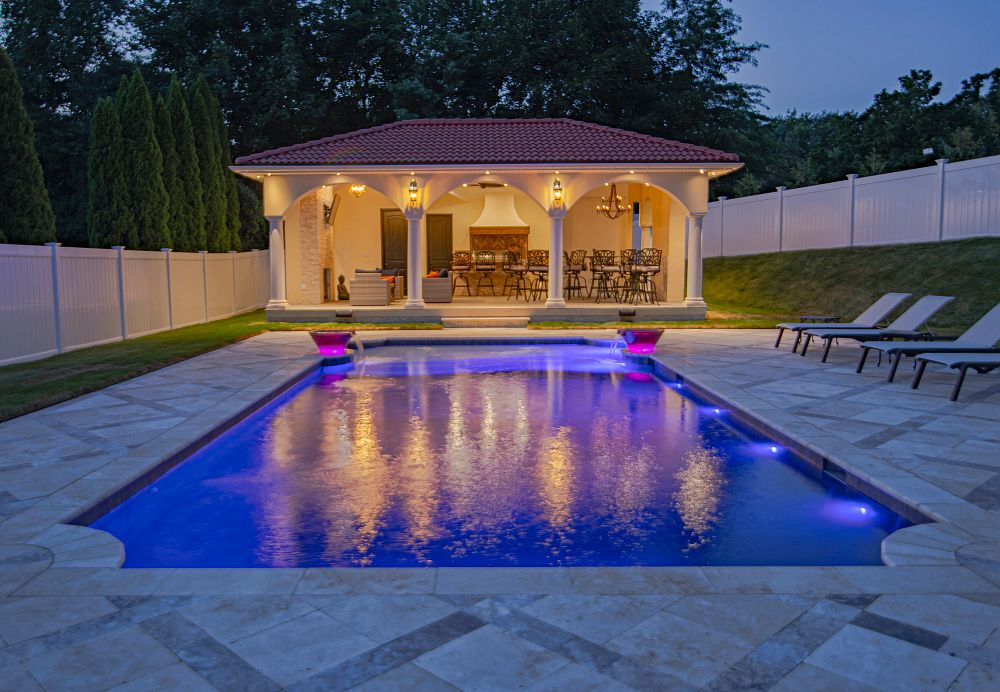
Vinyl Liner Pool Installation Process
Ah, the sweet anxiety of waiting for your new pool to be installed! Although installing a vinyl liner pool can be quite a process, the end result is worth it and will give you decades of enjoyment and memories to be made. However, it can ease your mind to be aware of what’s involved in making your dream pool a reality. Here’s what you can expect throughout your vinyl liner pool installation process:
- Measuring the area.
Your local pool builder will measure the area for your pool. This is a critical first step – “Measure twice, dig once”! - Permits and assessment.
Your builder will obtain the proper permits and assess your backyard for any buried or overhead utilities, as well as any issues – such as overly porous soil or a steep grade in your backyard – that may impact the pool installation process. - Excavation.
Your builder will then begin to dig out the space in your backyard for your pool. - Add steel walls.
Once the hole for your vinyl liner pool has been dug, your builder will create the steel walls for your pool frame. - Pour concrete.
After the steel frame has been added, your builder will then pour the concrete to secure the steel walls in place. - Add and align a new liner.
Once the structural framework for your pool has been set, it’s time for it to start resembling the pool of your dreams. We’ll drop in the liner you selected when planning your pool. The liner pattern you choose will give your pool its color and character! Use our vinyl liner visualizer tool to see how a liner of your choosing will look and try on other styles for size before you commit! - Smooth out the liner.
To make sure your pool looks as beautiful as you’d imagined it, we make sure any wrinkles are smoothed out of the liner, making sure it’s not too tight or too loose. - Seal the liner and fill with water.
Your pool builder will use a liner vacuum to be sure your liner is free from any air leaks before filling your pool with water. The weight of the water will also help seal your liner into place. Once the liner is set, we cut any remaining vinyl for a finished look.
Replacing Vinyl Liners or Reshaping Your Pool
If you own a vinyl liner pool, the day may come when you want or need to replace it. Maybe an older vinyl liner has developed a rip or tear – which can lead to leaks. Or maybe you just want to refresh the look of your pool. While a well-maintained vinyl liner will last for roughly 10 years, you may want to give your pool a makeover.
While replacing your vinyl liner can give your pool a fresh new look, sometimes, you may want a more dramatic makeover. Some homeowners decide to change the shape or depth of a pool for a number of reasons. Reshaping a pool can allow you to add more safety features – such as multiple entry and exit points, shallow areas or swim ledges – that can allow small children or adults with mobility issues to get more enjoyment out of a pool.
While many pool owners love having a pool as a way to bring the whole family together to make memories, your pool can also be a relaxing and lively spot once the kids are grown. When the kids fly the nest, some homeowners reshape their pool to include more features for adults to enjoy – including a spillover spa and a swim-up bar.
A vinyl liner pool can be reshaped by a professional to better fit your current lifestyle – giving you even more enjoyment in the years to come.
Automatic Pool Covers
Purchasing an automatic pool cover can not only help to protect your investment and save you money in the long run, but also protect your family when your pool isn’t in use.
- Added safety. Perhaps the top reason to consider an automatic pool cover is to prevent pets and children from accidentally falling in. In addition to providing a protective barrier that helps keep your family safe, an automatic pool cover can also protect you from liability due to unauthorized use of your pool and unwanted guests, should someone decide to hop your fence and go for a swim.
- Easier pool maintenance. An automatic pool cover can help keep debris and other unwanted items out of your pool. Falling leaves, insects – and even bits of food – can get into your pool, throwing off your water chemistry or potentially clogging filters. An automatic pool cover can help keep your pool cleaner, which translates to less skimming and vacuuming of your pool and more time enjoying it!
- Energy savings. According to the U.S. Department of Energy, an automatic pool cover can save you between 50% and 70% on your energy bills. A pool cover can reduce water evaporation and the need to refill your pool, as well as better regulate your water’s temperature. As the world is striving for greener, more sustainable measures, an automatic pool cover can help you do your part to conserve water and energy.
Vinyl Liner Pool Maintenance in New Jersey
Vinyl liner pools bring a lot of joy to their owners – but also require regular maintenance to keep them looking their best and ensuring you get many years of enjoyment from them.
- Be mindful of your water chemistry. Changing weather is one of several factors that can impact your water chemistry. New Jersey residents experience hot, humid summers – but also have brisk autumn and moderate springtime weather and rainfall, which can throw off the delicate balance of your pool water. Learn how to properly balance your water chemistry with your vinyl liner pool and you’ll be happier for it!
- Don’t allow chemicals to make contact with your liner. Adding chemicals to your pool to balance its pH requires a delicate touch. Be sure they do not make direct contact with your liner, instead touching only the water itself. Chemicals such as chlorine can bleach or contribute to deterioration of your liner, causing you to have to replace it sooner than you’d like.
- Gently brush your liner. Use a soft-bristle brush or sponge to gently brush your liner once each week. This can help dirt, stains and chemical deposits from building up.
- Never empty your vinyl liner pool completely. New Jersey pool owners may want to partially drain their vinyl liner pools before winter sets in, closing it down for the season. This can help prevent against water freezing and expanding inside your pool, causing damage when temperatures hit their winter worst. Vinyl liner pools require some special handling, as your liner can shrink or tear if you completely drain your pool. Never drain your vinyl liner pool more than half the total volume to be sure your liner stays in good shape!
- Only use pool-safe toys. Avoid any toys or pool furniture with sharp edges, as they can tear or damage your liner.
- Check your liner for leaks. If you see wrinkles in your pool liner, it may be a sign of a leak. If you spot one, be sure to patch it as soon as possible to help salvage your liner.
- Tend to any wrinkles in your liner. Your vinyl liner can sometimes develop wrinkles due to a number of reasons, ranging from water chemistry problems or age. You can sometimes even out these wrinkles by gently walking along the pool floor to spread the wrinkles with your feet. In other instances, you may want to call in a professional to evaluate the situation instead of risking damage.
Check out our vinyl liner maintenance checklist for a deeper dive on keeping your pool sparkling and a hub of activity!
New Jersey Pool FAQs
How much do inground pools in New Jersey cost?
There is no one-size-fits-all answer as to how much it costs to install an inground pool in New Jersey. Numerous factors impact the cost, including the size of your pool, materials used, any add-on features you may want to incorporate and even the size, soil and terrain of your yard. Learn more about inground pool costs & prices here.
In terms of fiberglass pools, according to Derek C. Blasker of Fiberglass Pool Designs, “Latham fiberglass pools are a great option in New Jersey because of their ability to retain heat, which allows our customers to run their pool heaters less and enjoy their pools more. In this current economic environment, everyone is looking to save money but obtain great value, and purchasing a Latham fiberglass pool allows the customer to save money on chemicals, utilizes, and maintenance, while also receiving the highest quality pool in the market.”
The best way to get an accurate cost estimate is to speak with an independent builder. Not only can working with a builder help you bring your vision to life, but they can help assess what is possible given your backyard and your budget.
What type of inground pool is best for New Jersey?
In recent years, many New Jersey homeowners have embraced fiberglass inground pools and vinyl liner pools, making them a popular choice throughout The Garden State. These pools are easy to maintain and, fiberglass in particular, can make for a fast and smooth installation – giving you more time to enjoy your pool.
Do I need a permit to put a pool in my backyard in New Jersey?
Yes. According to the International Residential Code (IRC) of New Jersey, any structure that is used for swimming or recreational bathing (including pools, hot tubs, or spillover spas) that hold more than 24 inches in depth of water, requires a permit. It’s important to check with your state and local building authorities to be sure of the exact permits needed to build your pool according to code, as you may also require zoning approval and engineering approval in addition to construction permits. Working with a qualified professional builder can help you to be sure your pool meets all legal requirements for the state of New Jersey, as well as local building codes for your city, town or municipality.
How much is a pool permit in New Jersey?
The cost of a pool permit in New Jersey may vary from year to year, as well as allow for slight variances based on your town or municipality. For example, a permit to build an in-ground pool in Jefferson Township costs $200, while a permit for an above ground pool is $100. These fees do not include additional fees for electrical or plumbing sub code permits.
How long will a fiberglass pool last in New Jersey?
Typically, a fiberglass pool can last between 25 to 30 years, but some can last for even longer if properly maintained. If you’re looking for a pool to grace the backyard of your New Jersey home, a fiberglass pool can give you decades of use and countless memories to be made.
New Jersey Inground Installation Areas
Latham is the largest designer and manufacturer of pools throughout the US. We proudly serve many happy customers throughout New Jersey, including those in:
- Newark
- Marlboro
- Freehold
- Stafford Township
- Egg Harbor Township
- Little Egg Harbor Township
- Winslow
- DeptfordBordentown Township
- Ewing Township
- Burlington
- Pine Hill
- Vineland
- Millville
- Trenton
- Cherry Hill
Start Your New Jersey Pool Project with Latham Pools Today
Whether you want to live your Real Housewives of New Jersey fantasy poolside, or envision many family gatherings and outdoor barbecues clustered around the pool, the dream of owning a pool in The Garden State is well within reach. At Latham, we’ll help you make the pool of your dreams a reality. Get in touch with an expert builder and start planning your beautiful new pool today!
Have questions? Contact us for more information and become one of countless New Jersey homeowners who love their Latham pool.

